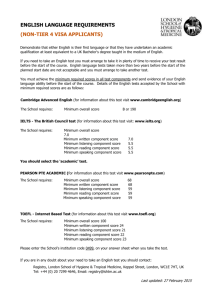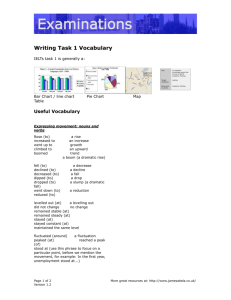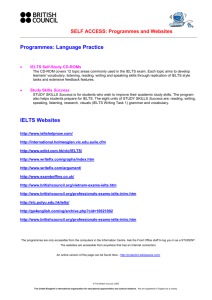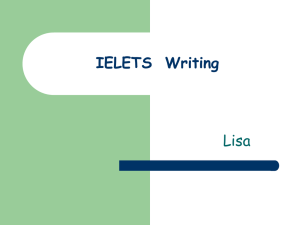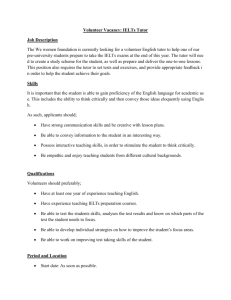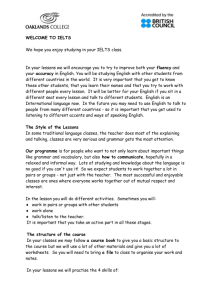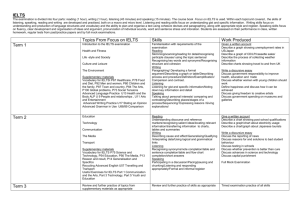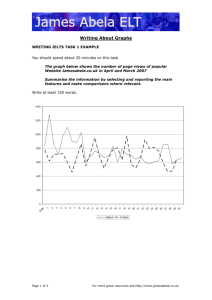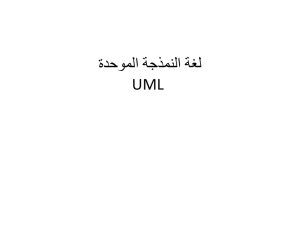Cambridge International Training Centers (Sudan)
advertisement
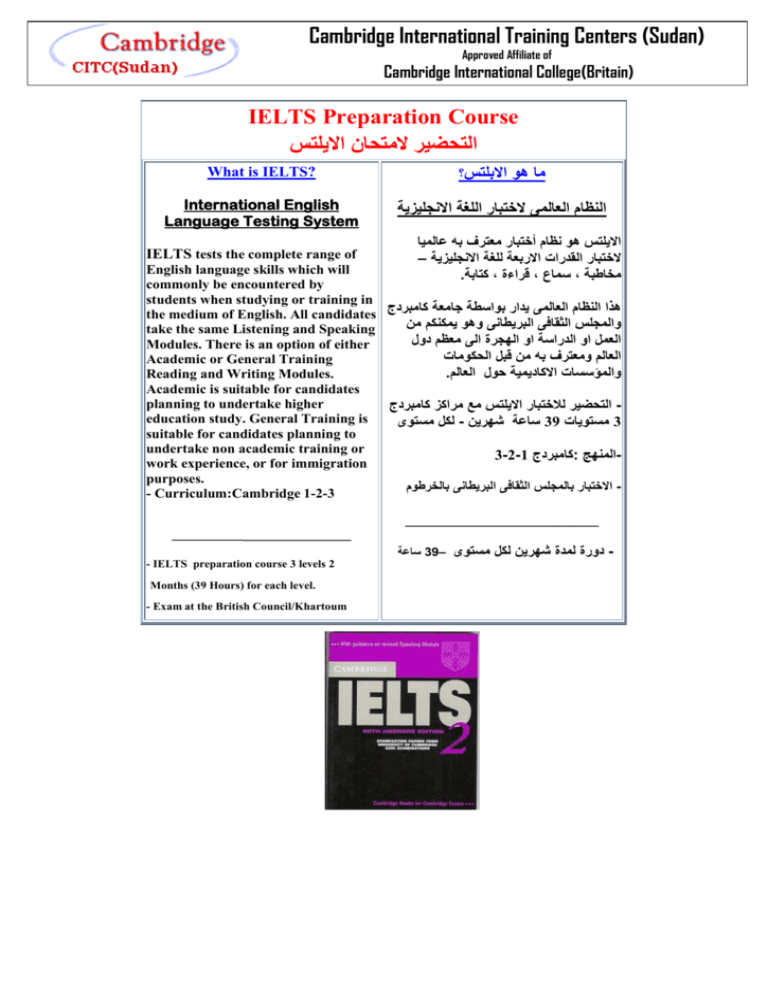
Cambridge International Training Centers (Sudan) Approved Affiliate of Cambridge International College(Britain) IELTS Preparation Course التحضير المتحان االيلتس What is IELTS? ما هو االبلتس؟ International English Language Testing System النظام العالمى الختبار اللغة االنجليزية IELTS tests the complete range of االيلتس هو نظام أختبار معترف به عالميا – الختبار القدرات االربعة للغة االنجليزية . كتابة، قراءة، سماع، مخاطبة English language skills which will commonly be encountered by students when studying or training in the medium of English. All candidates هذا النظام العالمى يدار بواسطة جامعة كامبردج والمجلس الثقافى البريطانى وهو يمكنكم من take the same Listening and Speaking العمل او الدراسة او الهجرة الى معظم دول Modules. There is an option of either العالم ومعترف به من قبل الحكومات Academic or General Training .والمؤسسات االكاديمية حول العالم Reading and Writing Modules. Academic is suitable for candidates planning to undertake higher التحضير لالختبار االيلتس مع مراكز كامبردجeducation study. General Training is لكل مستوى- ساعة شهرين33 مستويات3 suitable for candidates planning to undertake non academic training or 3-2-1 كامبردج: المنهجwork experience, or for immigration purposes. االختبار بالمجلس الثقافى البريطانى بالخرطوم- Curriculum:Cambridge 1-2-3 _________________________ ________________________ ساعة93– - IELTS preparation course 3 levels 2 Months (39 Hours) for each level. - Exam at the British Council/Khartoum دورة لمدة شهرين لكل مستوى- Introduction to the IELTS The IELTS is the International English Language Testing System. It is prepared by the University of Cambridge ESOL Examinations together with its partners, including the British Council. The IELTS is a new test, and it has two versions. The General Training (GT) module is for those who need an English language qualification for their work, because they are moving to an English-speaking country or simply because they want to measure their general English ability. Many governments around the world require some of their workers to have the IELTS, and so do many professional organizations and employers. The GT module tests your ability to use English in different social situations, and because this module is suitable for people wanting to do secondary education in an Englishspeaking country, there is also an educational part, but less than in the academic module. Overall, more than 1,500 organizations accept or require an IELTS qualification. The Academic module is often used to check whether a student is ready to study in a university where the teaching is in English. Universities in many countries accept the IELTS as an English Language qualification, and even some universities in the USA now accept it instead, or as well as, the TOEFL test. The IELTS is becoming more and more popular. Over a quarter of a million people take the test every year. There are more than 400 test centres in 120 countries, and the number is increasing all the time. The test centres are run by either the IELTS organizations or by the British Council, and your nearest British Council will be able to tell you where to take the test. Make sure that they know which module you want to take. You usually get your results in less than a month, and you have to wait for 90 days before you can take the test again. The result is usually valid for two years. The IELTS exam lasts for two hours and 45 minutes. It has a listening, a reading, a writing and a speaking part. There is no grammar part to the test, and grammar is not tested as intensively as it is in (for example) the Proficiency test, but if you have bad grammar you will not do well. The listening, reading and writing are set in that order, but because it is harder to arrange, the speaking may be the first or the last part of the exam. The Listening lasts 30 minutes. There are four sections and 40 questions in all. You will hear a conversation (for example someone wanting to buy something), a general talk, often giving you some kind of information – for example about a town or museum, A conversation related to learning or training, and an educational or training lecture. Recordings are played only once. The Reading takes 60 minutes. It has three parts, and like the listening, has a total of 40 questions. The academic test is three passages. These come from books, magazines and newspapers, and at least one of these presents an argument (arranges facts to persuade you of something), which you must show you have understood. The GT reading has a wider mixture of material, mostly the sort of thing that someone living in an English-speaking country would come across every day. As well as books and magazines, there is material from advertisements, pamphlets and instruction manuals. One text will be longer and descriptive. The Writing also takes an hour. There are two parts. The academic writing has a report of about 150 words for the first part, in which you have to describe the information shown in a schematic (e.g. a graph, table or diagram). The second is about 250 words, in which you have to discuss an opinion or a situation. In the GT the first part is also 150 words, in which you have to ask for information or explain something. The second part is 250 words, and is discursive (that is, you have to explain your opinion on something). The Speaking is somewhere between 10 minutes and a quarter of an hour. You have to answer some questions from the interviewer, about things like where you live and your hobbies or other personal details. You then have talk for some time on a particular topic, though you are given a minute to prepare what you are going to say, and the final few minutes are spent in a more general conversation with the interviewer. Each module is marked in a band from 1-9, but as each band is divided into two, you can get any one of 18 different marks. There is no 'pass', since the mark you want will depend on what you need the test result for. Some people doing the test might not think listening is important, while it might be vital for others. The bands are: 9 = expert user Fluent and functional English. Understands well, and can express what he wants to say. (Notice that you do not need perfect English to get a band 9 mark). 8 = very good user Makes only occasional mistakes, and mostly these do not affect understanding. Can read and explain fairly complicated ideas. 7 = good user Makes mistakes, and sometimes uses ungrammatical language. There are occasional misunderstandings, but someone at this level can generally use and understand complicated sentences. 6 = competent user Can use complicated language, but only in areas which he knows well. Makes mistakes and sometimes uses the wrong words or expressions. Sometimes does not understand complicated English. 5 = modest user Makes mistakes often, but though he does not understand every word, usually understands what he is hearing or listening to is about. Can use and understand English adequately only in some situations. 4 = limited user Cannot make or understand complicated English. Does not understand complicated explanations, makes many mistakes. But he can usually communicate and understand basic ideas. 3 = extremely limited user Has difficulty in saying what he wants in English. Often does not understand what he hears or reads. 2 = intermittent user Only understands some words, and has trouble making them into basic sentences. Can only communicate basic ideas with difficulty. 1 = non-user Understands a few English words, but not enough for communication. 0 = no attempt Did not attempt the test
